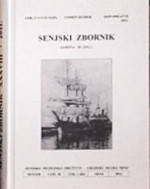Hrvatske krajiške pukovnije u francusko-habsburškom ratu 1809. godine (II). Marmontov rat u Lici i Dalmaciji
The Croatian border regiment in the Franco-Habsburg War 1809 (part two). Marmont's War in Lika and Dalmatia
Author(s): Nikola TominacSubject(s): Local History / Microhistory, Military history, Political history, 19th Century
Published by: Senjsko muzejsko društvo i Gradski muzej Senj
Keywords: Napoleon; Franco-Habsburg War of 1809; Croatian military history; General Auguste Frédéric Marmont; battle at Gračac; battle at Bilaja; battle at Brloga (Brinja);
Summary/Abstract: In the last few years in a series of anniversaries two centuries have passed since the establishment of French imperialist governance over thus region and wider regions. As in the history of the First French Empire and also over the entire history of this region the episodes were indeed short-lived. Yet they have, until this day, been controversial themes in the histories and memories of all human communities of their successors. In order to mark the significant events in Croatian military history the author publishes results of research into the operations of the French General Auguste Frédéric Marmont in the area of Lika during his campaign from Dalmatia towards Vienna. Very extensive material from two major works were used, which were published for the 100th anniversary of the "Krieg 1809" – 2nd volume, by authors Maximilian von Hoen and Alois Veltze. The work was published in Vienna in 1908. Another important work is by military historian Vice-Marshal Emil pl. Voinovich "Bojevi u Lici, u ostaloj Hrvatskoj i Dalmaciji godine 1809" "Actions in Lika, the rest of Croatia and Dalmatia in 1809", published in Zagreb in 1907. These works provide basic military-political and operational data necessary for research. Other segmented sources describe individual events of this time and are of secondary importance.When in May 1804 Napoleon became the French Emperor, and this sparked fears in Vienna about a possible attempt to take the crown of the Holy Roman Empire. The Habsburg dynasty could no longer count on a safe option for the throne because most of the German princes were no longer Roman Catholics, but Protestants, and many of them were directly under the influence of Napoleon. In July 1806 Napoleon created a pro-French Rhine alliance which 16 German princes joined. Thus ceased to exist the Holy Roman Empire and Franz II (I) was forced to renounce the honour of the Holy Roman Emperor of the German nation. In wanting to restrain and restrict the power of the French Emperor, European countries led by the Habsburg Monarchy created a fifth anti-Napoleon coalition and in 1809 launched a new war. The French preoccupation with the war in Spain, when after a light victory French soldiers fell in a bloody and brutal battle with Spanish guerrillas, thus giving the allies an optimistic prognosis. Austria declared war on France on 9th April 1809. The battlefields stretched from Spain and Italy in the south and from Poland to Germany in the north. The main battlefields and the greatest concentrations were in Bavaria and Northern Italy.However, the development of events did not fall into the hands of the Habsburg military commanders. Their forces were pushed back from Bavaria towards the wider area of Vienna and there they needed to enact the decisive battles of this war. Due to this the Habsburgs retreated from Italy, and so Marmont moved from Dalmatia towards Vienna as reinforcement for French forces. To prevent him from these intentions the Croatian Border Regiment fought against him inthe areas of northern Dalmatia and Lika. The main battles in this campaign took place in the Zrmanja river valley and the area north of Knin, near Gra!ac, Gospi" and Brinje. The border troops reported enviable heroism and resistance, even though they were unequipped and untrained old men and boys, because the elite border troops were participating in the Habsburg campaign in Italy.This is a continuation of the contributions "The Croatian Border Regiment in the Franco-Habsburg War 1809", published in the 37th Senj Almanac in 2010. It should be noted that the continuation of research about the participation of the inhabitants of Lika in the Napoleonic Wars and their activities in the system of French forces, respectively, during the Illyrian Provinces in our area need to be elaborated. Special attention will used to process the military activities of Napoleon's catastrophic campaign in Russia, where inhabitants passed through the real hell of the Russian winter and suffered huge losses.
Journal: Senjski zbornik - prilozi za geografiju, etnologiju, gospodarstvo, povijest i kulturu
- Issue Year: 38/2011
- Issue No: 1
- Page Range: 167-192
- Page Count: 26
- Language: Croatian

